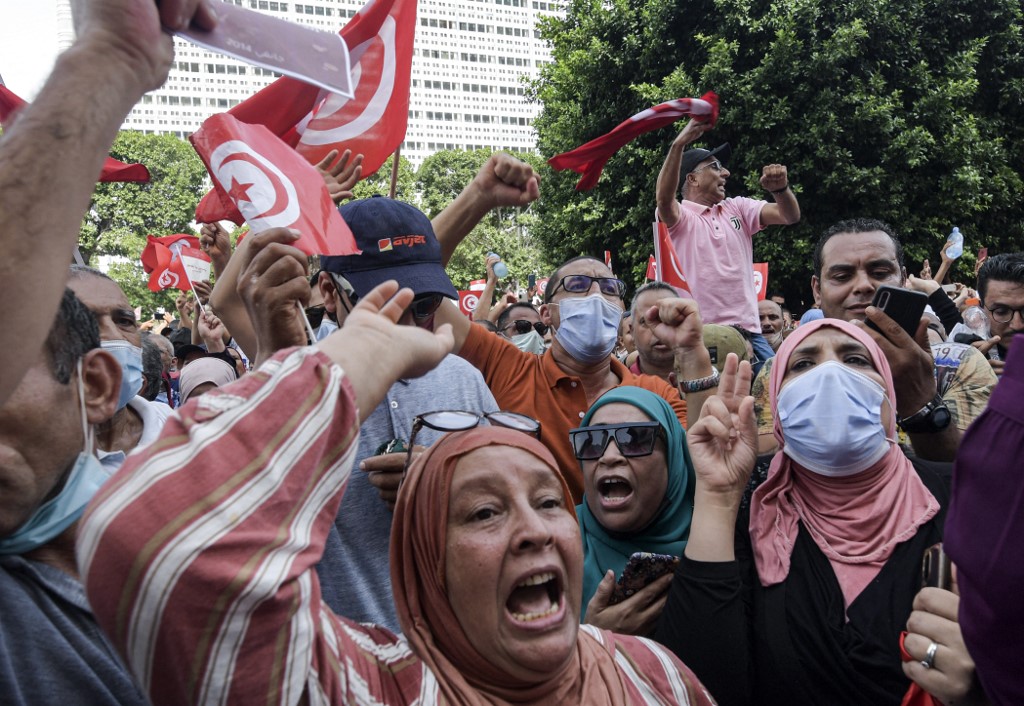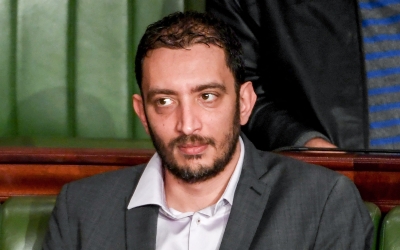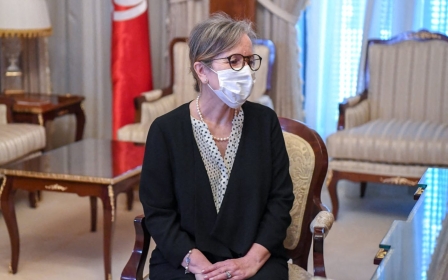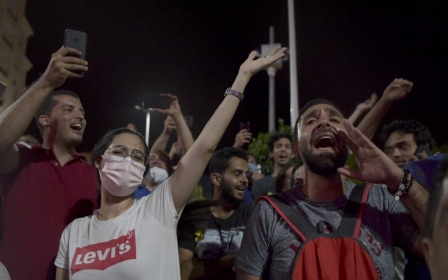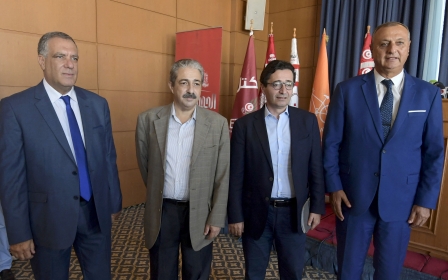Tunisia power grab: Former minister says Saied has turned clock back on revolution
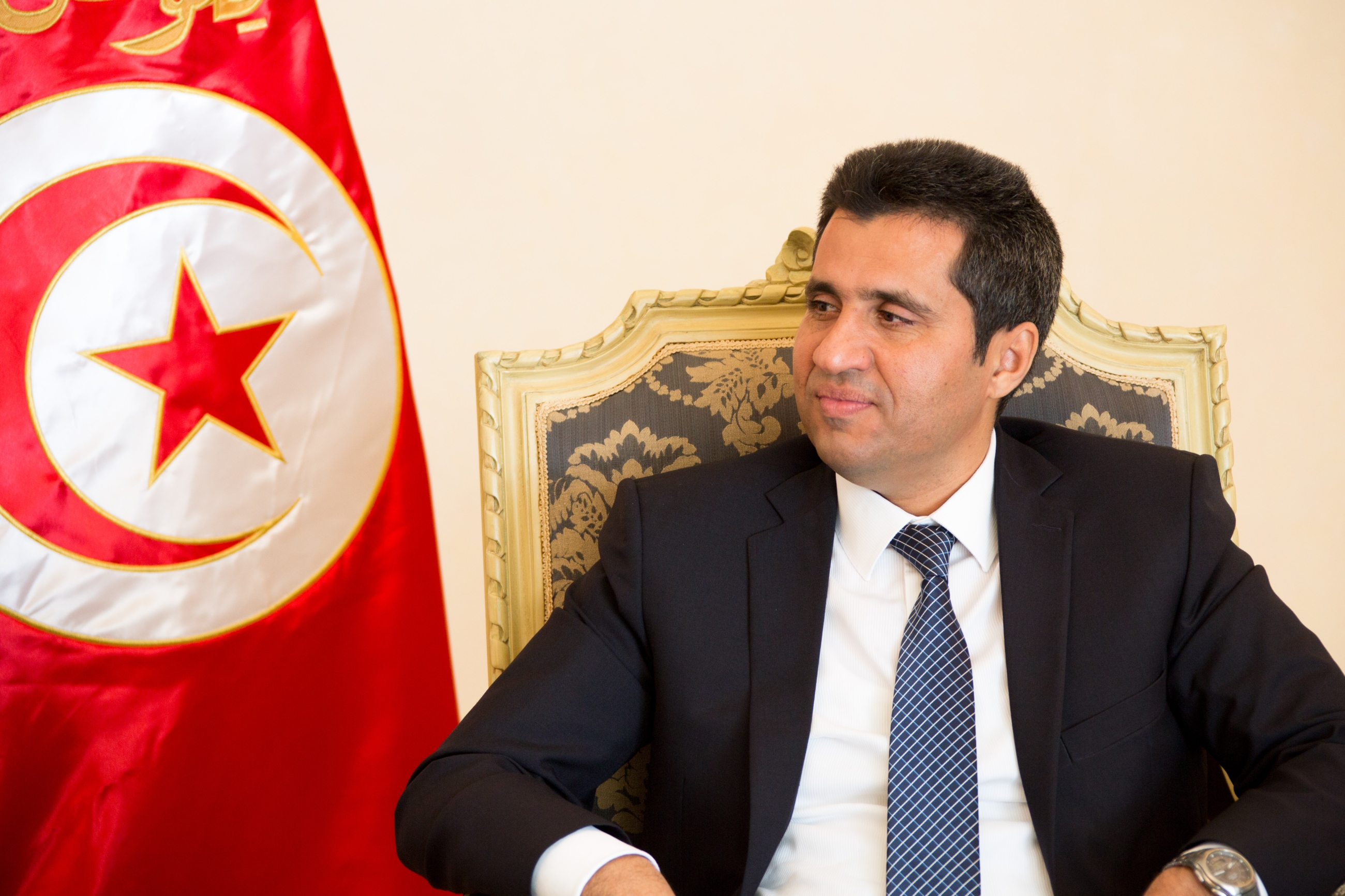
A former Tunisian minister says he has been under house arrest for more than 60 days and that authorities have refused to tell him why he is being held or when he will be released.
Anwar Marouf, 51, is a leading figure in Tunisia's Muslim-democratic Ennahda party. From 2016 to 2020, he was head of the communications and technology ministry.
Marouf told Middle East Eye he was arrested on 5 August in his hometown of Carthage, just days after Tunisian President Kais Saied suspended parliament, sacked the prime minister and assumed executive authority in the country.
Since then, he said he must obtain permission from local police to leave his home, including to attend prayers at his mosque, and has been repeatedly denied permission to travel in order to attend to family matters.
'Never in my life did I think that 10 years after the revolution and democratic transition, I would face the same thing I feared before'
- Anwar Marouf
Security agents have "searched, questioned, and humiliated" his relatives and anybody entering his residence while others have stayed away, fearful of associating with his family, he said.
New MEE newsletter: Jerusalem Dispatch
Sign up to get the latest insights and analysis on Israel-Palestine, alongside Turkey Unpacked and other MEE newsletters
“Never in my life did I think that 10 years after the revolution and democratic transition, I would face the same thing I feared before: a restriction of my liberties and freedom,” Marouf told MEE.
“Now things feel and look like before. People bowing down to a single political figure, the normalisation of extralegal actions and the return of ideological battles that allow individuals to dismiss democracy in order to get rid of their ideological opponents."
Marouf is the most prominent Tunisian politician to be targeted since Saied dismissed Prime Minister Hichem Mechichi. Five parliamentarians have so far been imprisoned.
MEE asked Tunisia’s interior ministry why Marouf was under arrest and when he was scheduled to be released but did not receive a reply.
During a wide-ranging interview from his home, Marouf reflected on the state of the country, which he believes is on the verge of bankruptcy - a failure for which he said all politicians are responsible.
And while he agrees that endemic corruption, which Saied has repeatedly said he will stamp out, is a major challenge, the former minister said the way the president is going about this task will only make the system more corrupt.
“Putting people under house arrest with no legal justification for unknown periods of time could set off a trend where anyone can come up and claim that they can put a supposedly 'corrupt' individual in jail or house arrest, all while dismissing the law,” he said.
“This eventually undermines the judicial court, and thus cripples the state’s ability to combat corruption in the future.”
'Totally encircled'
Marouf returned to Tunisia from exile in 2012, hoping to contribute to the country’s development after the revolution. With experience in information and communications technology, he served as an adviser to the minister of communications and technology.
He later headed the same ministry from 2016 until 2020 when he was dismissed from his post, along with all other members of the Ennahda party in ministerial positions, during the collapse of then-prime minister Elyes Fakhfakh's cabinet.
A month later, on the evening of 5 August, he said, local police and security officers “totally encircled” his home and demanded that he join them at a nearby police station. “Despite the station being merely 50 metres from my residence, an entire police brigade approached me late at night,” he said.
At the station, Marouf was told that Ridha Gharsallaoui, whom Saied appointed to oversee the interior ministry after dismissing Mechichi, had made an administrative decision to place him under house arrest.
The Ennahda politician returned to the police station three days later with three lawyers, requesting a warrant or any other legal documents justifying the order, but left empty-handed.
Over 60 days later, Marouf has yet to learn why he is under arrest and is stuck in a bureaucratic paradox: without a copy of the administrative decision that put him under arrest, he said his lawyers are unable to challenge it in court.
The only detail that security personnel have provided is that his detention will only end when the ongoing emergency measures, decreed by Saied on 25 July, conclude.
Marouf suspects that an earlier case involving his family is now being used as justification to detain him.
In March 2020, his daughter was involved in a car accident. Soon after the collision, MP and lawyer Mohamed Abbou launched an inquiry into the accident and filed a case with the judiciary, alleging that she had used a car provided by Marouf's ministry.
The incident made national headlines, but the judiciary hasn't proceeded with the case. Suddenly, said Marouf, it has come back into the spotlight after Saied's power grab in July, when the president and his supporters used it as an example of corruption in the country.
“The real question, though, is why [has] this became a national issue almost a year after it occurred?” Marouf asked.
“The automobile collision was used as part of the political rhetoric surrounding the need for exceptional measures once we entered the period of political paralysis following 25 July. They are yet to present any other pieces of evidence to legitimise my house arrest.”
The uncertainty of the situation, paired with the social stigma of being under arrest, are taking their toll on Marouf and his family.
“What is most upsetting about this entire scenario is that my family is being treated as if they are also under house arrest,” he said. “I have an 11-year-old child who dreaded the prospect of returning to school, fearful of alienation as a result of my current circumstances.”
How to fight corruption
When Kais Saied took the reins of power in July, he promised a major overhaul to combat and root out the corruption that has plagued Tunisia for decades.
On multiple occasions since then, he has revealed corruption files without naming names, vowing to “pursue them and to recover the Tunisian people’s money”.
As he watches events develop from his house, Marouf has become increasingly concerned that Saied's decisions and anti-corruption campaign will have an adverse impact on the country.
“You cannot put all people in jail and trial them in front of a military court because that is not how democracy functions. It must be an institutional process,” he said.
At the end of July, Tunisian independent MP Yassine Ayari was imprisoned for almost two months by Tunisia's military court after branding Saied's decision to suspend parliament and dismiss senior officials as a "military coup”.
The former head of Tunisia's anti-corruption agency, Chawki Tabib, was put under house arrest after security forces evacuated the authority's headquarters in August.
“When you do something like that, all while proclaiming your fight is against corruption but you still have not prosecuted any of the high-profile corrupt figures, what does that say about your commitment to truly fighting corruption?” asked Marouf.
Marouf said he referred several corruption cases involving Tunis Air, the Tunisian Railways company (SNCFT) and Tunis's Rades port to the state’s judiciary, but they were rejected. “We lost almost 100 million dinars when it comes to Tunis Air, but this is yet to be dealt with,” he said.
Earlier, he said he had called for state institutions to be standardised and digitised to make it hard for anyone to hide graft.
“There was extreme resistance from certain individuals that did not allow this to go through, despite being offered almost $40m from German donors for the development,” he said. “This was also the case when we tried to open an investigation on the other corruption files as well.”
All politicians to blame
Saied has previously suggested the country was being run by a “mafia", though he has refused to say who or what he menas by that. Marouf, on the other hand, views the country's present political crisis as the result of a lack of political will from all actors across the political spectrum.
“We cannot isolate Ennahda's shortcomings from those of others,” he said. “While Ennahda may have created the impression of being a member of the governing forces for the last decade, the reality is that we never really had the authority to rule."
The real source of Tunisia’s woes, he said, is the lack of comprehensive economic reform, a decade after the country’s revolution. With the state now on the verge of bankruptcy, it’s a failure he puts on the shoulders of all those who were in power.
'We have now been without a government for almost 60 days. We have no clue what the economic and financial landscape will look like in 2022'
- Anwar Marouf
“The will of almost all political players was very fragmented. Even when parties united, coalitions were formed to prevent the political scene from disintegrating without a thorough study of any socio-economic issues,” he said.
“The state has failed to transform the country into a platform for economic change, one open to investment and the creation of wealth."
But Marouf said he fails to see how Saied’s actions will resolve the country’s economic problems.
“We have now been without a government for almost 60 days. We have no clue what the economic and financial landscape will look like in 2022,” he said.
“Economic return files for 2021 are nowhere to be located. The borders with Libya have been blocked, thus cutting off income for thousands of people. Investment has also ceased entirely.”
The instability of the political scene in Tunis, along with the lack of a vision for the future, has prompted Marouf to believe that the president’s current decisions are “not a solution.”
However, he still holds out hope that his country can turn a corner if it can find a "strong political mind capable of reflecting on the political situation and implementing a more effective political programme”.
This person, he said, “would convene all forces for a national dialogue in order to arrive at an appropriate national solution to the challenges at hand, while prioritising these concerns according to their significance and relevance to the Tunisian people”.
Middle East Eye delivers independent and unrivalled coverage and analysis of the Middle East, North Africa and beyond. To learn more about republishing this content and the associated fees, please fill out this form. More about MEE can be found here.


